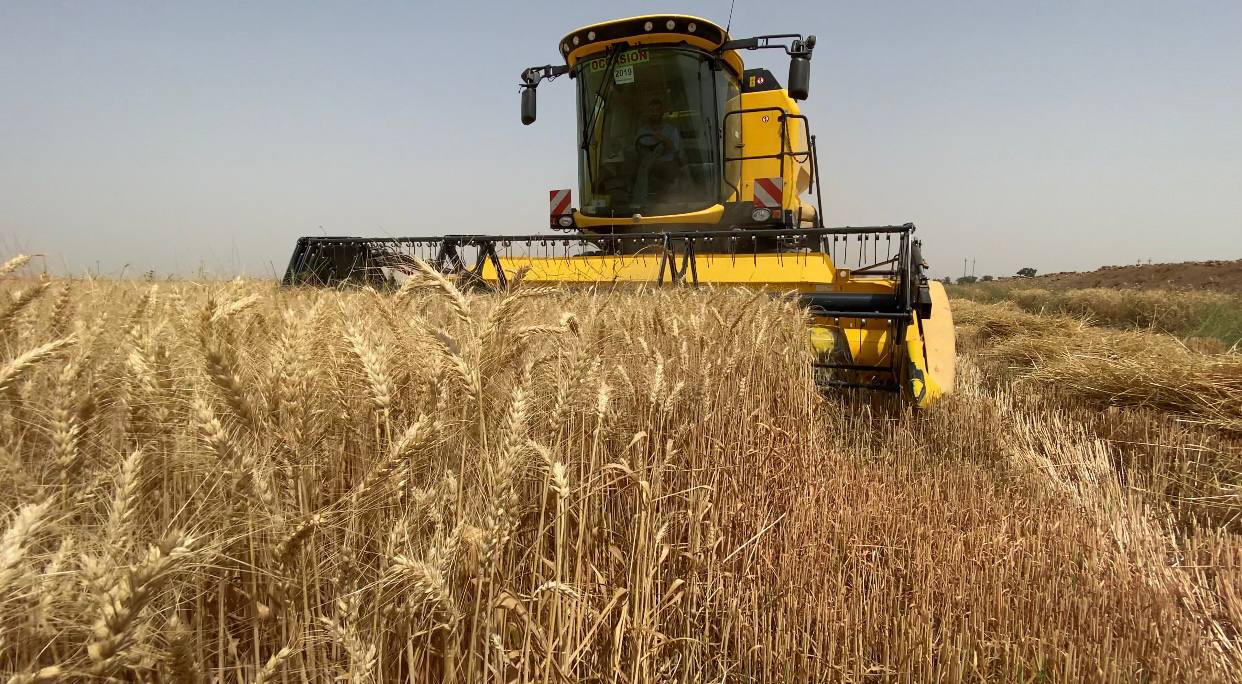Villagers have launched campaign to harvest wheat due on June in fear of setting fire to their fields by the militants of the extremist Jihaddist group of Islamic State in Iraqi and Syria ISIS.
Villagers in Daquq district south of Kirkuk have started harvest this week while usually wheat is harvested in June.
Mohammed Abdul-Salam, is harvesting his field in Daquq. “It should be done in 20-30 days because the wheat is not dry yet but we are obliged because we fear burning it ahead of harvest alike the last year.
Daquq agriculture office figures show about 700 donums of wheat and barley were burnt last year before harvest season. The local authorities and the villagers accused IS militants of deliberately setting fire to the fields.
“We know pre-season harvest is harmful and the products won’t be perfect but this loss is better than losing all. Last year we have not been compensated,” Abdul-Salam added.
“We know pre-season harvest is harmful and the products won’t be perfect but this loss is better than losing all. Last year we have not been compensated,”
The harvest is done at daytime only in fear of ISIS, he added.
Local authorities prefer to harvest wheat on time, or expose it to sunlight before warehousing.
Ayad Hussein, head of agricultural lands department of Daquq Agriculture office said its time for harvest of barley “but since they are harvesting wheat as well, it is better not to gather it till it dries up, otherwise it will be damaged.”
In the first week of May, IS launched three attacks against the Iraqi and Kurdish security and military forces in Kirkuk. Six Iraqi soldiers and Kurdish Peshmerga fighters were killed, six injured, and two oil wells bombed.
The oil rich-city of Kirkuk is home to about 1.2 million Kurds, Turkmen and Arabs, according to KRG figures in 2018. Kirkuk, located 238 kilometers north of Baghdad, is the center of the disputed territories where Iraqi security forces have taken control in October 2017 following the declaration of defeat of ISIS by Iraqi government.
The villagers blame local authorities for lack of proper grain bulk warehouse, silo, and absence of immediate funds for purchase of their products.
Abu-Bakir Mohammed, has joined his colleagues in the early harvest of the premature grain.
Mohammed said lack of silo pushes them to market their harvest in the center of Kirkuk or the adjacent district of Duz Khurmatu. “This is big cost for us.”
He blames of the government for delay in payment for the wheat and barley they deliver to the government annually. “We have not been paid for last year so we are forced to sell our products for lower prices to the traders so that we can get some money earlier.”
“We have not been paid for last year so we are forced to sell our products for lower prices to the traders so that we can get some money earlier.”
Last year, the Iraqi government has determined IQD560,000 ($380) for a ton of wheat yet it is up for 610,000 ($410) the coming harvest.
“The price is not fixed yet because total production volume of grains is not clear so it might be changed,” Hussein added.
Daquq has delivered 48,000 tons of wheat and 128 of barley to Iraqi ministry of trade last year yet the experts expect a drop to half due to draught and poor rainfall.
Kiukuk agriculture has set an annual plan to plant one million donums all over the province yet only 700,000 donums were cultivated, said Zuher Ali director of Kirkuk agriculture office.
Ali expects 350,000 tons of crops while in 2020 over 600,000 tons were produced.





